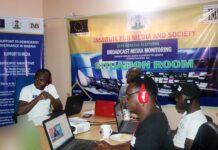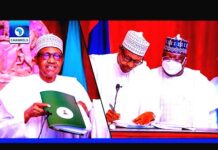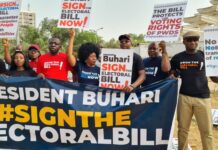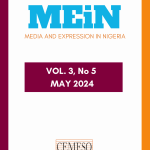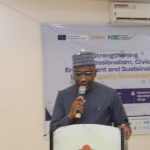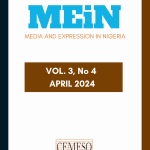In the last two weeks or so, the nation’s major political parties have embarked on what ordinarily should pass for routine activity – the conduct of primaries to elect candidates for the forthcoming general elections.
However, judging by the level of acrimony and bickering not to mention violent deaths in some states, the primaries cannot be said to have been routine.
There have been internal wrangling, defections, imposition of candidates, pre-determined outcomes, thwarting democratic processes, shooting to kill, thuggery and vote buying.
If this foreshadows what 2019 would be then we are in for a rough time in the political process. Our politicians have been showing that they are anything but democrats!
Why are aspirants to political office so desperate to secure nominations? Why are the parties so skewed in favour of conducting rancorous primaries?
Why are the parties so steep in money politics? Why have the parties not internalised democracy as a way of conducting their affairs?
If they cannot respect democratic principles in the selection process within their parties, can they sustain democracy in the country?
Can they respect the same principles in inter-party contests? Where are the ideas? Where are the men of character and honour in the parties?
Will decent men be encouraged to participate in a process which empowers the powers-that-be to pre-determine winners?
Do the parties and individuals think about legacies? Are they committed to entrenching democracy?
These and many more are troubling questions on the minds of long suffering Nigerians.
Under normal circumstances, the internal affairs of the different political parties are indeed their own business.
However, the times are not normal. Political immorality is practised and celebrated as the new normal.
More often than not, the activities of political parties tend to heat up the polity through outright abuse of processes.
It is no longer fashionable therefore to assume that reason and common sense will always prevail.
It is even curious that Nigeria’s First Lady has been so disgusted by the governing party (of her husband) that she berated the conduct of the ruling party’s primaries.
Besides, it will be recalled that the political inferno which engulfed the South West and the entire nation subsequently in the 1960s started as an internal matter of Action Group (AG). This is a useful historical lessons our politicians have failed to imbibe.
Also, Nigerians are worried whether a political party that does not respect the tenets of democracy in its internal affairs can abide by the time-tested rules of democracy.
Put simply, how can a party that cannot govern itself democratically govern the nation democratically? Certainly the party leaders cannot give what they do not have.
This is scary after about two decades of unbroken democracy in the country.
It is an open secret that at the party conventions, which held recently money was frittered away as if prudence had gone out of fashion.
Delegates were reportedly induced by huge sums of money, some in foreign currency.
The higher the aspirants paid the more likely they would be nominated. Delegates returned home rich by selling their votes.
The implication is that contestants have ab initio compromised themselves on the road to power. If this is not corruption then corruption has to be given a new name.
Indeed, during the last governorship elections in Ekiti and Osun states, chieftains of the major parties allegedly induced voters with money.
No nation, which is serious about entrenching democracy, would tolerate the chicanery that goes on in the name of party primaries.
Our politicians are our equivalent of earthquakes and tornadoes: they ruin.
Nature has graciously spared Nigeria the natural disasters, which often plague some nations. But in Nigeria, the political class has unwittingly turned itself into the country’s encounter with natural disasters.
Their unstable ways, greed and avarice, nepotism and outright fraudulent behaviour have cost the nation thousands of lives.
Poor economic or financial judgment has cost the nation greater disasters than earthquakes. Some states, which refused or failed to pay salaries before the elections suddenly found money to do so. What a country!
One area in which the politicians have behaved so unseemly is defection from one party to other. There are no principles involved.
No ideological commitment is evinced by the flip-flop movement. Democracy can never thrive without people of identical political orientation and thinking.
The political parties therefore are depicted and used like special-purpose vehicles (SPVs) for the reason of getting to power. This is prostitution of the highest order.
A nation that is governed by political immorality cannot create a just and fair society. That is why we are groaning and struggling.
The impunity stinks to the high heavens. Credible people avoid politics for this reason.
In all of this, the average voter has a significant portion of the blame.
Whether at the level of intra-party politics or general elections the Nigerian voter seems willing to sell his soul for the proverbial mess of pottage.
In the end, they elect persons who do not respect the terms of the social contract between governors and the governed.
Much of the money spent on voters are stolen funds; monies stolen from the coffers of the states and the Federal Government.
Indeed, the nation’s elected leaders simply pay lip service to fighting corruption. This is a tragedy for the Nigerian people.
The political parties need to redeem their image. As a first step, the next elections have to be credible.
The umpire body, Independent National Electoral Commission (INEC) must live by the rules of engagement, by being seen to be independent and above board.
It must detach itself from all the contestants on the field of play.
A situation in which they give the impression that they are the ‘errand boys’ of the government in power sends wrong signals and is antithetical to the spirit and practice of democracy.
The average voter should be ready to defend the outcome of elections. Vote buying is a moral offence.
Any party, which sustains the practice cannot claim the moral high ground in the scheme of things.
Once manipulation is suspected, the proper rules for remedy must be followed. The onus, however, is on the political class.
If by design or default they fail to entrench democratic principles they would be the ultimate losers.
The entire country would be worse for it. It is also so easy to blame INEC for all the atrocities without considering the implications of police and other security agencies’ involvements in electoral malpractices.
So, political leaders and security agencies have a primary responsibility to ensure that INEC does its job credibly.
It will be tragic for the country if security agencies are accessory after the fact of electoral malpractices and collapse of democracy in Nigeria.
[ad un




